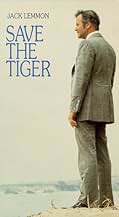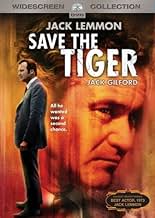Füge eine Handlung in deiner Sprache hinzuTroubled garment manufacturer Harry Stoner tries to make his small debt-ridden factory survive, hires an arsonist to burn down a building so Harry can collect the insurance money, he pimps f... Alles lesenTroubled garment manufacturer Harry Stoner tries to make his small debt-ridden factory survive, hires an arsonist to burn down a building so Harry can collect the insurance money, he pimps for clients, and has flashbacks to the war.Troubled garment manufacturer Harry Stoner tries to make his small debt-ridden factory survive, hires an arsonist to burn down a building so Harry can collect the insurance money, he pimps for clients, and has flashbacks to the war.
- 1 Oscar gewonnen
- 2 Gewinne & 5 Nominierungen insgesamt
- Ula
- (as Liv Von Linden)
- Tiger Petitioner
- (as Biff Elliott)
- Model
- (Nicht genannt)
Empfohlene Bewertungen
Jack Lemmon delivers a brilliant, Oscar-winning performance as Harry Stoner, a middle-aged man at the end of his tether, who confuses his personal midlife crisis, and the failure of his fashion business, with what he sees as the USA's moral decline in the post-war years. Obsessed with the lost cameraderie of his active service in the war, with the baseball and jazz giants of yesteryear, and with the slain and fallen idols of the 60s (Kennedy, King, Monroe etc), he sleepwalks into his own moral abyss of an arson plot, comforting himself that he is no worse than the times in which he lives.
Lemmon's character is countered by those of Phil Greene, his business partner, convincingly played by Jack Gilford, and Meyer (William Hansen), the firm's veteran, expert cutter and refugee from Nazism. Phil does not suffer Harry's sense of disillusion, because he is too down-to- earth to have experienced the illusion in the first place; Meyer, also, despite superficial discontent with the changing times, gains strength from his skill and family life.
For me, the main theme here is the familiar one of the lost American Dream, and the film brings to mind the final lines of the seminal exploration of that theme, the Great Gatsby - "So we beat on, boats against the current, borne back ceaselessly into the past." Harry's American Dream is not of a golden future, but of a golden past; it isn't lost, it simply never existed. But, that said, in this movie thematic analysis definitely takes second place to appreciation of Lemmon's bravura performance.
Little did I know, that thirty years later, I would be going through one of my own and would once again be drawn to, and struck by, the sincerity and integrity of Jack Lemmon's performance.
The film has it's critics, self indulgent, sentimental and simplistic are only some of comments made, but the film still has the power to make you question what you have done with your own life. It asks you how you got to where you are, and it makes you ask yourself if it was all worth it. It also questions/exposes the Great American Dream and asks, if that is not the be all and end all, then what is?
Harry Stoner is not a man you should feel sorry for, but Lemmon's interpretation forces you to question his ideals and your own, as you follow this crisis point in his life. In the end, whether you like the film or not, or agree with what it is trying to say, you can't deny Lemmon his Academy Award.
He plays Harry Stoner, owner of an heavily indebted ladies designer clothes manufacturing company. The film covers just 2-3 days of his life and we get a pretty good idea of his sad existence in the urban jungle and what he has become - no longer a good, decent person fighting for the right cause. There are references to Stoner's war record and patriotism throughout the film. The fact that the US was fighting the very unpopular Vietnam war could have influenced the themes of this film.
There is little in the way of plot but there is a rich characterization made deeper by the crises in Stoner's life and Lemmon's excellent depiction of a man who is cracking at the seams. My favorite scenes were the ones in the car with the hippie girl towards the beginning of the film and the question she asked him and Lemmon's comic reaction....
Harry Stoner (Lemmon) is as an LA businessman who seeks an arsonist to burn him out so he can collect the insurance and rebuild his failing business. His aging partner Phil Greene (Jack Gilford) opposes this, but realizes at his age (close to 65) he may never find another job. Both men are decent but jaded, and troubled by the lost innocence (or false innocence) of their youth in Brooklyn. Harry is also troubled by post-traumatic stress flashbacks from his lost comrades at Anzio in World War II, while Phil is troubled by going along with a crime that means losing his integrity. Both men appear to be Jewish, and may feel added burdens that come with having beaten anti-Semitic discrimination (or worse). There is the also longing for their boyhood in New York, before crime made cities less safe, and before the Dodgers (plus these two men) deserted Brooklyn for Los Angeles - which is not quite the sunny paradise that both probably hoped for. This film also came out in 1973, as Watergate, Vietnam, and the non-success of the Great Society all seemed to evidence a certain national decline.
Save the Tiger is like "Death of Salesman Goes To LA." There is fantasy, failure, and searing struggles for success. The two main characters are not so tragic as Willie Loman; yet they are not all that far removed, either.
Wusstest du schon
- WissenswertesActor Jack Lemmon waived his usual fee and worked for scale plus a percentage of the gross. Scale was US $165 a week at the time.
- PatzerHarry wipes Fred's face almost completely clean of the red body paint. In a subsequent shot, Fred's face is covered with red paint again.
- Zitate
Myra: Are you OK? Do you want something?
Harry Stoner: Yes. I want that girl in a Cole Porter song. I wanna see Lena Horne at the Cotton Club - hear Billie Holiday sing fine and mellow - walk in that kind of rain that never washes perfume away. I wanna be in love with something. Anything. Just the idea. A dog, a cat. Anything. Just something.
- VerbindungenFeatured in Paramount Presents (1974)
- SoundtracksAir Mail Special
Composed by Jim Mundy, Benny Goodman & Charlie Christian
Top-Auswahl
- How long is Save the Tiger?Powered by Alexa
Details
- Erscheinungsdatum
- Herkunftsland
- Sprachen
- Auch bekannt als
- Save the Tiger
- Drehorte
- Produktionsfirmen
- Weitere beteiligte Unternehmen bei IMDbPro anzeigen
Box Office
- Budget
- 1.000.000 $ (geschätzt)
Zu dieser Seite beitragen






















